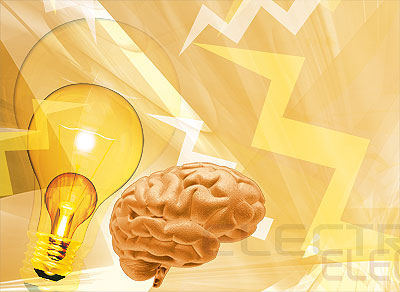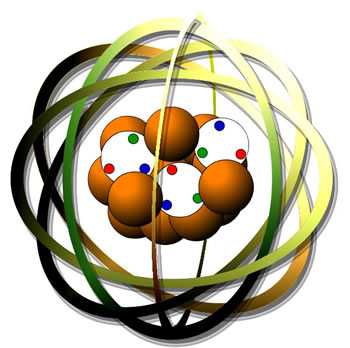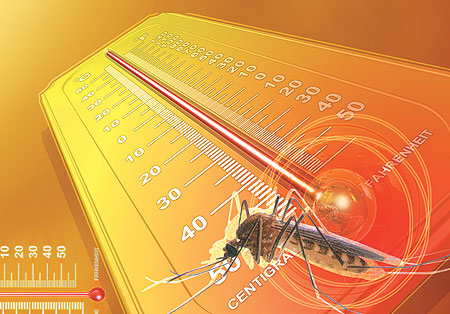 |
The brain consists of approximately 80% water, 10% fat, 8% proteins, and small amounts of carbohydrates, salt, and other minerals. Each one of its nerves functions by receiving electrochemical signals. Neural networks store memories by weakening or strengthening their many connections, and the result is memory. Encountering unfamiliar situations or looking at a portrait for the first time, for example, causes the cells to make new arrangements among themselves. The relevant nerves immediately strengthen their connections and attempt to define the situation. The data recorded enable the process to be carried out faster when the same situation is repeated, for what was new before will now appear familiar. The brain stores processes repeated throughout one's life as a general image. Every recorded moment comes about by means of the 1,000 to 500,000 connections that the brain's 100 billion nerves establish at a speed of 400 km per hour (248.5 mph).
With this superb capacity, the brain uses enough energy to run a dim lamp. Although it constitutes only one-fiftieth of the body's weight, it consumes one-fifth of the body's entire oxygen and glucose supplies. So important is the brain that it receives the first blood emerging from the heart; if only a small amount of blood is left, it still seeks to keep the brain alive. The heart, blood vessels, and all other organs are literally aware of this fact.
The slightest brain damage can leave a person handicapped or even dead. In fact, this organ is so delicate that the failure of electrical signals to reach a single cell can cause the loss of one of the senses that enable us to perceive the outside world. No single point in it can come into being by chance, and its perfect organization and equipment cannot be altered in a random manner.
This perfection, a very great blessing, reflects the creative artistry of Allah, Who treats His servants well, the Beneficent Who creates to perfection, The Maker and He Who Reveals His Greatness in All:
It is He Who shows you His Signs and sends down provision to you out of heaven. But none pay heed save those who repent. (Surah Ghafir, 13)
 |
Each atom consists of protons and neutrons bonded together in the nucleus, around which electrons revolve rapidly. Since the neutron carries no electrical charge and the proton has a positive charge, the nucleus is positively charged. The electron, on the other hand, has a negative charge proportional to the proton's positive charge. If the proton and the electron's electrical charges were unequal, the proton's greater electricity would cause all atoms to be positively charged and thus repel each other. As a result, everything on Earth, including human beings, the seas and mountains, and all the planets in the Solar System and all the heavenly bodies in the universe would suddenly break apart into countless minute particles and cease to exist.
Throughout their lives, human beings are unaware of the subatomic particles that attract each other, the electrons spinning rapidly around the nucleus, and their delicate internal balances and forces. Even its minutest components contains such breathtaking details that clearly only Allah, the Lord of absolute will and a force far greater than all known worldly forces, could have brought them into existence.
Despite living in such an exceedingly delicate and sensitive system, human beings never feel any difficulty or concern, because the system's creation is flawless. And yet the majority of people are unaware of these blessings. If one of them were removed, they would see how helpless they actually are and would become aware of the great compassion that had formerly surrounded them. The important thing in this worldly life, which is no more than a test, is for people to be grateful as they enjoy His blessings and mercy and turn toward Him. One reason for our existence is to see who will appreciate these bestowed blessings and who will be heedless and ungrateful. Sincere believers need to know that only Almighty Allah can bestow these blessings; thus, they should be constantly grateful to Him for them.
Do the unbelievers not see that the heavens and Earth were sewn together and then We unstitched them, and that We made from water every living thing? So will they not believe? (Surat al-Anbiya', 30)
 |
A mosquito can detect the presence of any living thing due to its highly sensitive heat receptors that perceive the heat given off by a living entity in different colors, according to the heat the entity emits. Since this perception does not depend upon light, a mosquito easily finds blood vessels even if the entity is in a dark room. In fact, its heat detectors are so sensitive that they can determine temperature differences of just 0.05 degrees Celsius (http://www.colostate.edu/Depts/Entomology/ courses/en507/papers_1997/roachell.html)
Human beings have no such ability; Allah has bestowed it on this tiny creature-it is no larger than 1 cm (0.4 in)-so that it can find food and protect itself. Only Allah can create such a small and flawless heat-dependent mechanism in so tiny a creature and then bring it to life. Clearly, no one can claim that such a remarkable creature could have come into existence spontaneously as the result of chance.
Any thoughtful person knows that a random phenomenon will only damage and destroy a perfect complex system; it cannot bring any system into being. Only Almighty Allah, Lord of the worlds, Who creates the mosquito's sublime heat perception system, shapes and forms all things, and controls everything at all moments can do this:
What is in the heavens and in the ground belongs to Allah. We have instructed those given the Book before you, and you yourselves, to fear [and respect] Allah. But if you do not believe, what is in the heavens and in the ground [stills] belongs to Allah. Allah is Rich Beyond Need, Praiseworthy. (Surat al-Nisa', 131)
 |
The nutcracker has the most powerful avian memory so far identified. Native to the large Rocky Mountains in North America and the Grand Canyon, it lives on pine nuts that are edible for only a few weeks in September. Therefore, it stores them for later consumption. The distance between the pine trees and the storage site may sometimes be as much as 20 km (12.4 miles). It buries the nuts by placing them in the hard soil in a single movement; sometimes it leaves a stone on top as a marker. Over the course of three hectic weeks, the nutcracker collects nuts constantly. As it flies, it remembers the land's contours, the trees it has visited, and the rock faces, all of which it adds to its mental map.
The nutcracker has to remember where it has buried 100,000 nuts along a portion of the Grand Canyon that measures hundreds of kilometers throughout this short but productive period. This is how it survives for the rest of the year. During winter, it has to remember the markers like a photograph, because the snow changes the landscape and renders the markers invisible. Nevertheless, it manages to locate 90% of the buried 100,000 pine nuts. (www.colostate.edu/Depts/Entomology/courses/en507/papers_1997/roachell.html)
It is impossible for a bird to know that the food it needs will not be available after a certain period of time and that it has to collect and hide enough to survive. How did it learn how much food to collect at which time, where to store it, and how to find all of the 100,000 pine nuts again under the snow? Yet it does all of these things flawlessly, for like all other living entities, it acts according to Allah's inspiration. Only the supervision and assistance of its Creator and the One Who inspires it to do certain things enables it to find its stored food, which has become invisible, without difficulty.
This amazing creation of Allah, Who observes all created entities and showers unlimited, boundless, and unknowable mercy upon them at all times, is plain for all to see. The details exhibited in such a tiny bird once again reveals His Might and greatness in the finest manner possible.
How many creatures do not carry their provision with them? Allah provides for them, and He will for you. He is the All-Hearing, the All-Knowing. (Surat al-'Ankabut, 60)
 |
The skin is a flawless casing that gives us a regular appearance; conceals the extraordinary activity going on inside our bodies; and makes touch, one of our most important senses, possible. Countless receptor nerves, circulatory channels, ventilation systems, heat and moisture detectors, and other manifestations of His artistry operate within it. The skin itself is both strong and elastic, two characteristics that are practically mutually exclusive.
Skin covers an area of 2m2 (21.5 ft2) and weights 3 kgs (6.6 lbs). Its cells live for about one week, after which they die and are replaced. During a person's life, 20 kgs (44 lbs) of skin cells are manufactured. Every square centimeter of skin contains sense cells that permit touch perceptions and assume various tasks, depending on their location. For example, when your hand comes into contact with boiling water, the receptors cause you to feel a sensation of heat and then one of pain. Some 30,000 receptors perceive heat; 3.5 million feel pain.
This perfect casing and special organ, which is unaffected by external factors and has enormous elasticity, can transmit messages from every square millimeter to the nerves and thence to the brain. In fact, it consists of a network of nerves and blood vessels that is constantly being renewed. Allah bestowed this miracle upon each person and endowed even its smallest part with sensation. So perfect is this miracle that modern technology cannot produce a similar structure.
This flawless casing protects us, enables us to touch other things, and gives us a pleasing appearance. A perfect blessing and flawless detail, Allah, in His boundless knowledge, created it and then bestowed it upon us:
It is Allah Who made Earth a stable home for you and the sky a dome, and formed you, giving you the best of forms, and provided you with good and wholesome things. That is Allah, your Lord. Blessed be Allah, the Lord of all the worlds. (Surah Ghafir, 64)